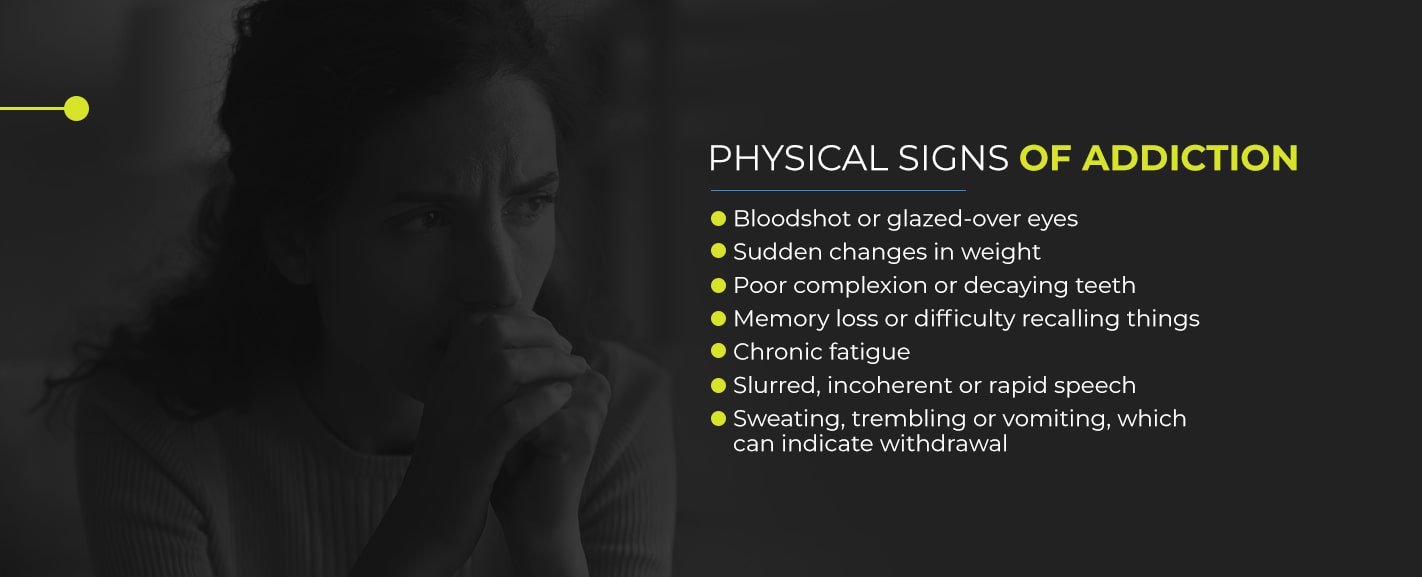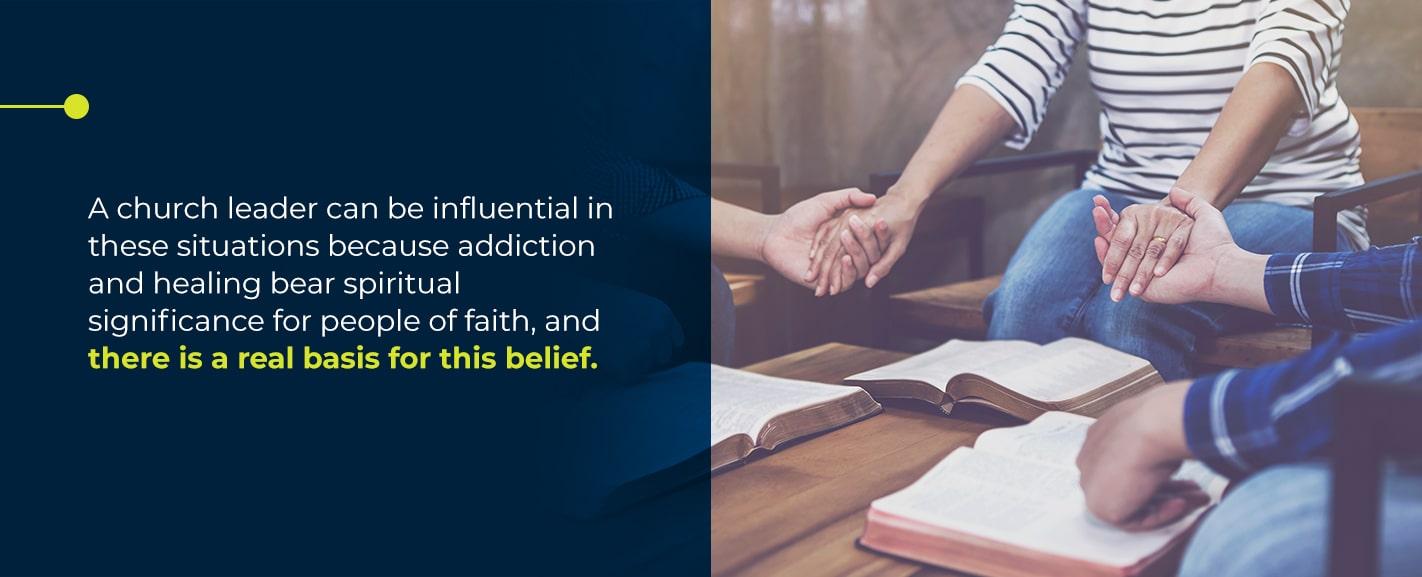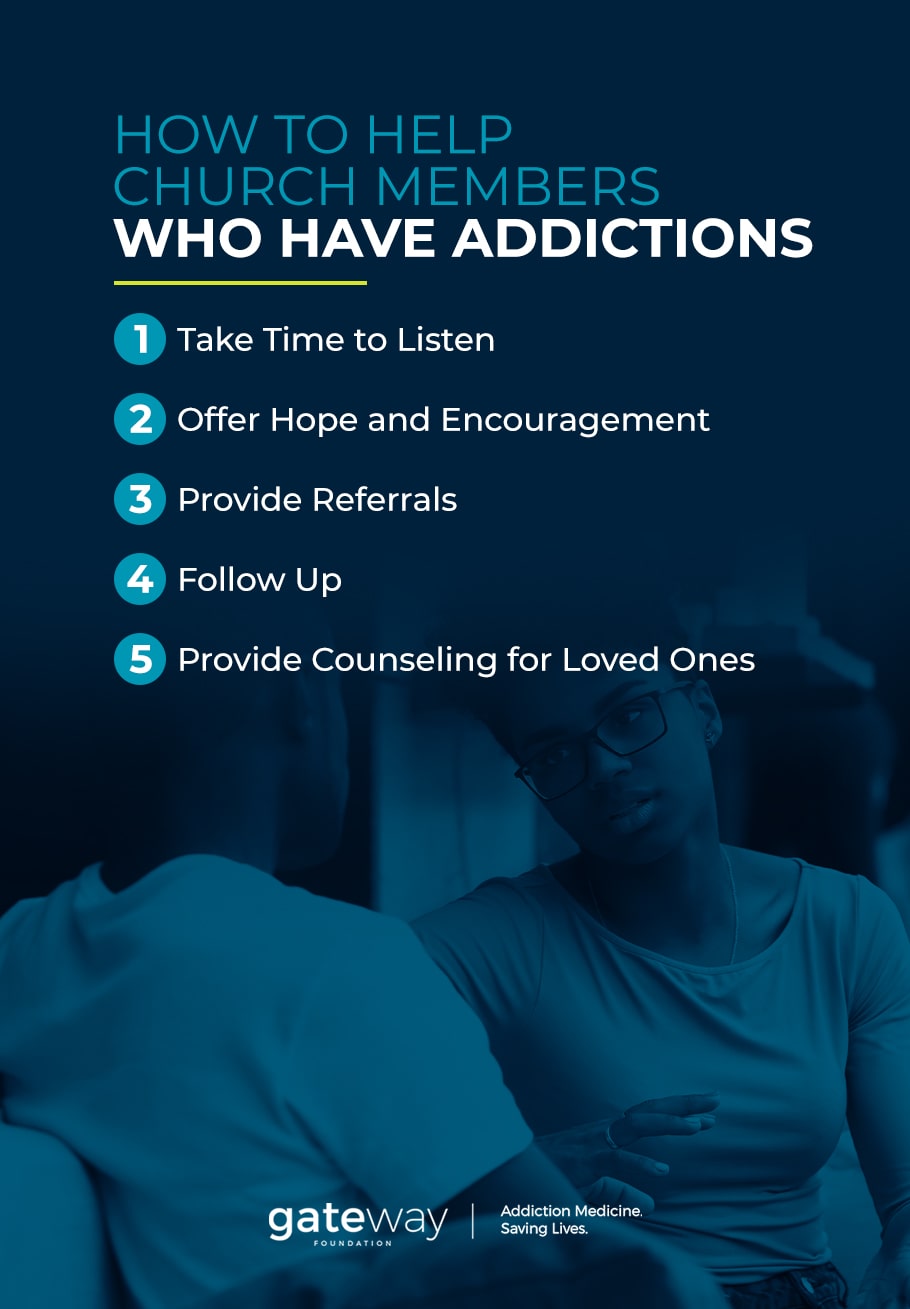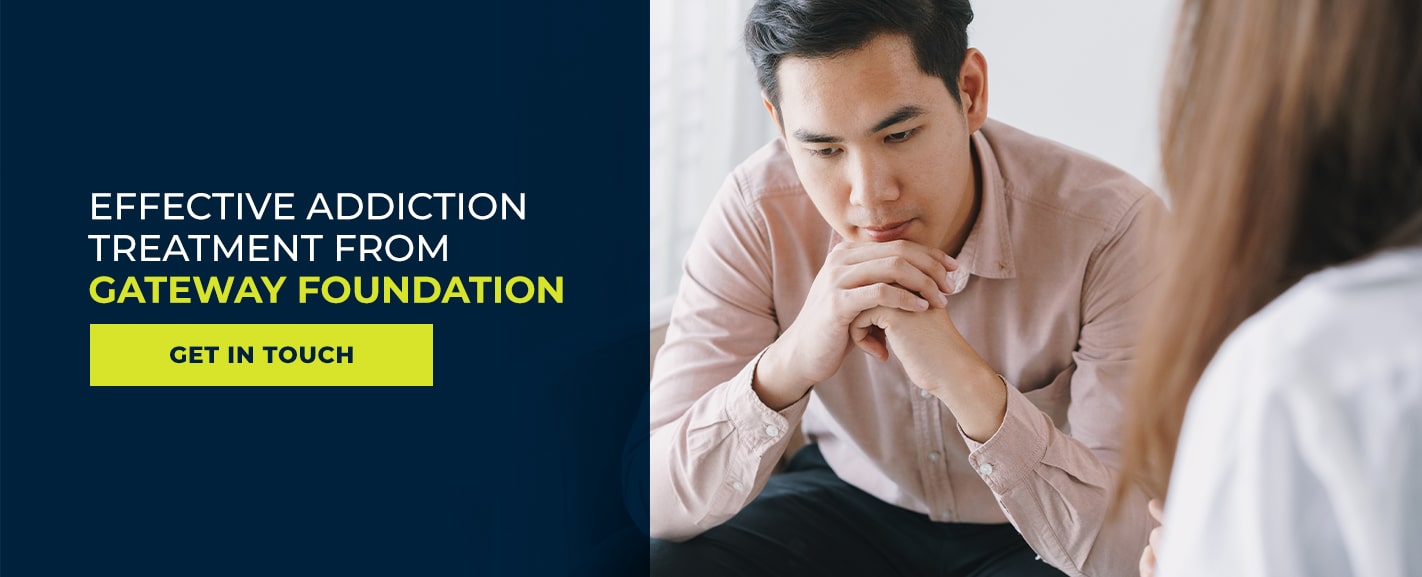- Nov 29
- Drug Addiction Treatment
According to the Substance Abuse and Mental Health Services Administration (SAMHSA), 20.4 million people aged 12 or older experienced a substance use disorder (SUD) in 2019. Addiction is a pervasive issue in our society, and it affects people from all walks of life, including religious people. As a member of the clergy, you can play a positive role in helping people in your faith community who are struggling with addiction or are impacted by a loved one’s addiction.
- Recognizing Addiction as a Clergy Member
- The Role Ministers Can Play in Caring for Individuals and Families Experiencing Addiction
- How to Help Church Members Who Have Addictions
- Effective Addiction Treatment From Gateway Foundation
Recognizing Addiction as a Clergy Member
You may learn of a person’s addiction when they themselves or a loved one comes to you to share what’s going on. However, many people may be tempted to keep their struggle to themselves rather than involve you. In these cases, it can help if you’re able to recognize a case of addiction while ministering to your congregation. When you recognize the warning signs, you can gently ask the person or their family member if they would like to talk.
Learn to recognize these potential signs that someone is dealing with an addiction to drugs or alcohol.
Physical Signs of Addiction
Substance use disorders cause physical symptoms, though some may be difficult to notice as an outside observer. For example, the person using drugs or alcohol may notice their sleep patterns are disrupted — something that isn’t necessarily apparent to you. There are some physical signs you may notice, including:
- Bloodshot or glazed-over eyes
- Sudden changes in weight
- Poor complexion or decaying teeth
- Memory loss or difficulty recalling things
- Chronic fatigue
- Slurred, incoherent or rapid speech
- Sweating, trembling or vomiting, which can indicate withdrawal
Behavioral Signs of Addiction
In many cases, behavioral signs of addiction may be easier for an outside observer to notice than physical symptoms. See if the person you’re concerned about exhibits any of the following behaviors, or if someone seeking your counsel has noticed these behaviors in their loved one:
- Apathy or despondency: If someone seems to be withdrawn or no longer has an interest in the hobbies and friends that used to bring them joy, it may be because they’re using drugs. It could also be due to mental health conditions like depression. In some cases, a person may be dealing with both a mental health issue and a substance use disorder concurrently.
- Broken relationships: Addiction can be a very difficult challenge in a marriage or family dynamic. A person battling a substance use disorder can often neglect their relationships, actively prioritizing the substance over their loved ones. They may treat others poorly or lie and manipulate, destroying bonds of trust. If you notice friction between people who were previously close, an addiction may be involved.
- Irresponsibility: You may also notice that someone who is using drugs or alcohol has become less responsible than they were before. Maybe they’re missing out on church events they used to attend or neglecting their personal or professional obligations. They may also seem to be taking risks they wouldn’t have before, such as making irresponsibly financial decisions.
- Mood swings: Sudden changes in mood, commonly called mood swings, are also typical in people struggling with addiction. They may experience intense highs and lows that are apparent to others around them. Bear in mind that mood swings can also be attributed to mental health disorders, such as bipolar disorder or attention deficit hyperactivity disorder (ADHD).
- Irritability or aggression: You might notice a normally pleasant person has become more irritable or even hostile lately. They may even become violent at times. These can be direct effects of the substance or substances they’re taking, or they may be symptoms of the early stages of withdrawal.
- Secrecy and dishonesty: A person trying to hide their addiction — either out of shame or to avoid intervention from others — may become more secretive or dishonest. This sign could look like overt lying, or it could just look like a person being less open about what’s going on in their life. For example, if you were counseling someone and they’ve been avoiding counseling sessions lately, it could be because they want to keep an addiction hidden.
The Role Ministers Can Play in Caring for Individuals and Families Experiencing Addiction
Clergy members can play a crucial role in helping people in their sphere of influence who are either experiencing addiction themselves or have a loved one dealing with addiction. The U.S. Department of Health and Human Services (HHS), SAMHSA and other government agencies and initiatives recognize the valuable role clergy and faith communities can play in addiction prevention and treatment.
A church leader can be influential in these situations because addiction and healing bear spiritual significance for people of faith, and there is a real basis for this belief. Over the years, scientific studies have confirmed that faith can positively impact a person’s health and well-being. A subset of these studies has focused on the positive role of faith in substance use prevention and recovery. Twelve-step programs continue to emphasize spirituality as fundamental to the recovery process.
Religious people are likely to see their or others’ addiction from a medical perspective and a spiritual perspective. It makes sense that they would want input from church leaders just as much as a medical professional — if not more. A clergy member may also feel like the safest person to come to with personal struggles, including addiction. Therefore, church leaders can serve as the first line of defense in helping church members address this difficult issue.
A study of African American churches found that most often, churches learn of a drug or alcohol use problem through a concerned family member or church member. Other common ways are by a church leader identifying the problem and approaching the individual or by the affected person going directly to the clergy member. Leaders can play a meaningful role in identifying problems, supporting people experiencing addiction and counseling their family members and loved ones.
How to Help Church Members Who Have Addictions
If you become aware of a situation of drug or alcohol misuse in your congregation, what should you do? Let’s look at a brief step-by-step guide for how to help church members who have family members with addictions and how to help people experiencing addiction themselves.
1. Take Time to Listen
First, if someone comes to you to talk, give them plenty of space to pour out their hearts before rushing ahead to solutions. People all have a deep desire to be heard, and those struggling with addiction can often feel misunderstood. Take the time to truly listen to what they have to say before you offer any counsel. You can also ask questions to learn more about the situation, letting them know they only need to share what they’re comfortable sharing.
2. Offer Hope and Encouragement
There is a social stigma surrounding addiction, which may be especially felt in religious communities. This stigma can make it difficult for people to share this struggle with a church leader. Be sure to alleviate a person’s fears if they come to you, and let them know you understand. No one is exempt from experiencing addiction in their life. Even a person of faith can slip into addiction and find it impossible to stop using on their own.
Of course, the person likely has some personal responsibility and may need to address how they’ve hurt their loved ones. But now isn’t the time for rebuke. Start by offering the person something they may not have within themselves — hope. The fact that they’re sharing with you is itself an important step and warrants some praise and encouragement. If a family member of a person with an addiction has come to you, reassure them that if their loved one wants to change, they can experience recovery and restoration.
3. Provide Referrals
While you may be able to provide some counseling and support, one of the best steps you can take is referring them to the resources they need to move forward. A writer for Lifeway Research explains in a message to church leaders that those with addiction need love and support, but they need more than you can give to recover. As a leader, you have many obligations that require your time, and you don’t necessarily have the medical expertise to help a person with an addiction get sober.
You may want to look into rehabilitation programs in your local area. You’ll be able to refer church members or anyone who comes to you for help to a place where they can undergo treatment for their addiction. This referral is crucial if they will be going through severe withdrawal symptoms that necessitate medical oversight.
4. Follow Up
After referring a person to a treatment center, you shouldn’t completely step away from the situation. You can still play an active role by following up with the person in the following weeks and months. Try to keep the lines of communication open throughout the person’s recovery process, encouraging transparency on their part. You can also check in with family members to see how things are going. Your ongoing support can mean a lot to someone undertaking this journey to sobriety.
5. Provide Counseling for Loved Ones
Addiction can introduce dysfunction and trauma into relationships in many ways. If a person has been manipulated or lied to by their spouse with an addiction, for example, they may develop a great deal of bitterness. Individuals may resent their sibling with an addiction because of the heartache they’ve caused their parents or the way they’ve consumed all the attention. Even long after a battle with addiction, old wounds may still linger, keeping family members from moving forward.
Whatever the case, family members and loved ones of people with addictions need healing of their own, and this can be an area where church leaders are an invaluable resource. If you have expertise in family or relationship counseling, you can use this skill to help people who are hurting in the wake of addiction. You may also want to refer someone to family support and programming from an addiction treatment center.
Resources for Getting Started
A step you can take right now to understand how to minister to a person who is addicted to drugs or alcohol is to learn more about the nature of addiction and the intersection of faith and addiction. Consult these resources to get started:
- NIDA: The National Institute on Drug Abuse (NIDA) from the National Institutes of Health provides a wealth of resources on their website. You can learn more about specific substance dependencies and view addiction research data.
- HHS: The U.S. Department of Health and Human Services provides a toolkit specifically to equip faith-based and community partners to better understand how to help people during the current opioid health crisis. They also provide a list of opioid-related resources from various government agencies for faith leaders and their members.
- SAMHSA: SAMHSA’s website is a great resource for education on both substance use and mental health issues. If you’re counseling the family of a person with an addiction, consult their family resources and pass these onto the people affected. SAMHSA also has a free, confidential helpline you can share with your congregation.
- NIAAA: If you want to learn more about alcohol addiction, the National Institute on Alcohol Abuse and Alcoholism (NIAAA) is a good resource. Its factsheet on treating alcohol problems is especially helpful if you’re counseling someone about considering various treatment options.
- Lighthouse Network: This Christian nonprofit ministry provides resources on their website about addictionand treatment. They also maintain a 24/7 helpline for people who are struggling and are there to help connect people with addictions to treatment options that fit their needs.
- The Center of Addiction and Faith: This center was started by the Fellowship of Recovering Lutheran Clergy. On their website, they provide addiction resources, including a page specifically for clergy, covering some core competencies to help them care for people with addictions. The center also hosts an annual conference clergy can attend to learn more about addiction and faith.
- JAAN: The Jewish Addiction Awareness Network (JAAN) provides a list of resources and programs, both at the national and state levels, specifically for those in the Jewish faith. You may find an online workshop, for example, where you can learn more about addiction in the context of your faith.
Effective Addiction Treatment From Gateway Foundation
Ministering to those with addictions is a valuable way clergy members can help their congregants with the very real problem of substance misuse. One of the best ways you can empower a person with an addiction to find restoration is by directing them to a professional treatment program.
At Gateway Foundation, we offer a variety of programs, including inpatient and outpatient treatment, support groups and more, to help people battling addiction and their families. We welcome you to contact us with concerns about your members or encourage them to reach out to us to learn more about our personalized treatment options.






